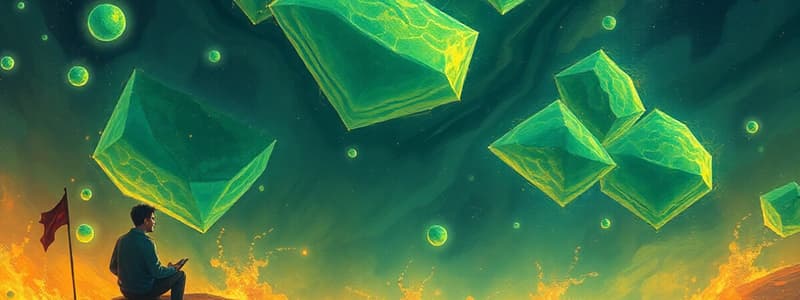Podcast
Questions and Answers
What is defined as the use of a substance for non-medical purposes?
What is defined as the use of a substance for non-medical purposes?
- Drug Abuse (correct)
- Drug Misuse
- Drug Tolerance
- Drug Dependence
Drug tolerance requires lower amounts of the substance to achieve the same effects.
Drug tolerance requires lower amounts of the substance to achieve the same effects.
False (B)
Name one example of a drug commonly abused in the Philippines.
Name one example of a drug commonly abused in the Philippines.
Shabu
Drug __________ is characterized by a strong desire to take a substance, making it a high priority.
Drug __________ is characterized by a strong desire to take a substance, making it a high priority.
Match the following factors with their descriptions:
Match the following factors with their descriptions:
Which of the following is a protective factor against drug use?
Which of the following is a protective factor against drug use?
Having multiple risk factors guarantees someone will misuse drugs.
Having multiple risk factors guarantees someone will misuse drugs.
What can lead to organ damage and addiction as a consequence of improper drug use?
What can lead to organ damage and addiction as a consequence of improper drug use?
Which of the following is considered a gateway drug?
Which of the following is considered a gateway drug?
Good family relationships are considered a protective factor against drug abuse.
Good family relationships are considered a protective factor against drug abuse.
Name one risk factor related to peer influence.
Name one risk factor related to peer influence.
Drugs that slow down the central nervous system are known as __________.
Drugs that slow down the central nervous system are known as __________.
Match the drug classification with its effect:
Match the drug classification with its effect:
Which effect is commonly associated with the use of depressant drugs?
Which effect is commonly associated with the use of depressant drugs?
Drugs of abuse can improve memory retention.
Drugs of abuse can improve memory retention.
What are some common short-term effects of alcohol consumption?
What are some common short-term effects of alcohol consumption?
What type of drugs are commonly prescribed to help reduce anxiety and tension?
What type of drugs are commonly prescribed to help reduce anxiety and tension?
Tobacco use does not lead to any severe long-term health effects.
Tobacco use does not lead to any severe long-term health effects.
Frequent involvement in petty fights and crimes can be a sign of __________.
Frequent involvement in petty fights and crimes can be a sign of __________.
What is one of the major long-term effects of using stimulants?
What is one of the major long-term effects of using stimulants?
Match the drug with its classification:
Match the drug with its classification:
Narcotics are also known as __________.
Narcotics are also known as __________.
Which of the following is NOT a characteristic of inhalants?
Which of the following is NOT a characteristic of inhalants?
Positive community programs can serve as protective factors against drug abuse.
Positive community programs can serve as protective factors against drug abuse.
Match the type of drug with its effect.
Match the type of drug with its effect.
What is a common misconception about drugs of abuse?
What is a common misconception about drugs of abuse?
Which of the following are family impacts of drug use?
Which of the following are family impacts of drug use?
The __________ is a term that refers to substances which can lead to a higher risk of using more dangerous drugs.
The __________ is a term that refers to substances which can lead to a higher risk of using more dangerous drugs.
Engaging in sports is a protective factor against drug use.
Engaging in sports is a protective factor against drug use.
Which of the following is an example of a narcotic?
Which of the following is an example of a narcotic?
What are some common household items that can be used as inhalants?
What are some common household items that can be used as inhalants?
The effects of drug use on school can include poor __________ performance.
The effects of drug use on school can include poor __________ performance.
What do narcotics commonly treat?
What do narcotics commonly treat?
Long-term use of hallucinogens can result in psychosis.
Long-term use of hallucinogens can result in psychosis.
Name one risk factor that can contribute to drug use.
Name one risk factor that can contribute to drug use.
The ability to cope with __________ and depression is crucial in fighting drug use.
The ability to cope with __________ and depression is crucial in fighting drug use.
Which of these is a common effect of inhalants?
Which of these is a common effect of inhalants?
Match the type of drug with its description.
Match the type of drug with its description.
Which of the following is NOT a consequence of drug use?
Which of the following is NOT a consequence of drug use?
Saying 'no' to drugs can include walking away from a situation.
Saying 'no' to drugs can include walking away from a situation.
What should you do after evaluating your choices regarding drug use?
What should you do after evaluating your choices regarding drug use?
To avoid the use and abuse of drugs, one should enhance ______ factors.
To avoid the use and abuse of drugs, one should enhance ______ factors.
Match the following actions to their purpose in preventing drug use:
Match the following actions to their purpose in preventing drug use:
What is the primary goal of treatment and rehabilitation programs for drug dependents?
What is the primary goal of treatment and rehabilitation programs for drug dependents?
Prevention of drug abuse is considered less effective than intervention after the fact.
Prevention of drug abuse is considered less effective than intervention after the fact.
Name one healthy alternative to drug use.
Name one healthy alternative to drug use.
Drug abuse can lead to ______ with family.
Drug abuse can lead to ______ with family.
Match the harmful effects of drug use with their descriptions:
Match the harmful effects of drug use with their descriptions:
Which of the following is a way to say no to drugs?
Which of the following is a way to say no to drugs?
Only the state is responsible for maintaining a drug-free society.
Only the state is responsible for maintaining a drug-free society.
What is one example of a mind game that can distract you from drug use?
What is one example of a mind game that can distract you from drug use?
Drug dependents can achieve their dreams through effective ______ and rehabilitation.
Drug dependents can achieve their dreams through effective ______ and rehabilitation.
Flashcards
Drug
Drug
A substance taken into the body (like through your nose, mouth, skin, or a needle) that affects your brain in some way.
Drug of Abuse
Drug of Abuse
A drug frequently misused due to its effects.
Drug Dependence
Drug Dependence
When a person needs a drug to function normally (physically, mentally, and emotionally).
Drug Misuse
Drug Misuse
Signup and view all the flashcards
Drug Abuse
Drug Abuse
Signup and view all the flashcards
Drug Tolerance
Drug Tolerance
Signup and view all the flashcards
Risk Factor
Risk Factor
Signup and view all the flashcards
Protective Factor
Protective Factor
Signup and view all the flashcards
Gateway Drugs
Gateway Drugs
Signup and view all the flashcards
Depressant Drugs
Depressant Drugs
Signup and view all the flashcards
Stimulant Drugs
Stimulant Drugs
Signup and view all the flashcards
Narcotics
Narcotics
Signup and view all the flashcards
Hallucinogens
Hallucinogens
Signup and view all the flashcards
Inhalants
Inhalants
Signup and view all the flashcards
Risk Factor (Peers)
Risk Factor (Peers)
Signup and view all the flashcards
Protective Factor (Peers)
Protective Factor (Peers)
Signup and view all the flashcards
Risk Factor (School)
Risk Factor (School)
Signup and view all the flashcards
Protective Factor (School)
Protective Factor (School)
Signup and view all the flashcards
Risk Factor (Community)
Risk Factor (Community)
Signup and view all the flashcards
Protective Factor (Community)
Protective Factor (Community)
Signup and view all the flashcards
Drug Abuse Myth (Memory)
Drug Abuse Myth (Memory)
Signup and view all the flashcards
Drug Abuse Myth (Digestion)
Drug Abuse Myth (Digestion)
Signup and view all the flashcards
Drug Abuse Sign (Mood)
Drug Abuse Sign (Mood)
Signup and view all the flashcards
Short-Term Effects of Alcohol
Short-Term Effects of Alcohol
Signup and view all the flashcards
Long-Term Effects of Alcohol
Long-Term Effects of Alcohol
Signup and view all the flashcards
Short-Term Effects of Tobacco
Short-Term Effects of Tobacco
Signup and view all the flashcards
Long-Term Effects of Tobacco
Long-Term Effects of Tobacco
Signup and view all the flashcards
Depressants (Downers)
Depressants (Downers)
Signup and view all the flashcards
Short-Term Effects of Depressants
Short-Term Effects of Depressants
Signup and view all the flashcards
Long-Term Effects of Depressants
Long-Term Effects of Depressants
Signup and view all the flashcards
Stimulants (Uppers)
Stimulants (Uppers)
Signup and view all the flashcards
Short-Term Effects of Stimulants
Short-Term Effects of Stimulants
Signup and view all the flashcards
Long-Term Effects of Stimulants
Long-Term Effects of Stimulants
Signup and view all the flashcards
Responsible Action
Responsible Action
Signup and view all the flashcards
Say No to Drugs
Say No to Drugs
Signup and view all the flashcards
Consequences of Drug Use
Consequences of Drug Use
Signup and view all the flashcards
Drug Abuse Treatment
Drug Abuse Treatment
Signup and view all the flashcards
Healthy Alternatives
Healthy Alternatives
Signup and view all the flashcards
Typical Results of Drug Use
Typical Results of Drug Use
Signup and view all the flashcards
Prevention
Prevention
Signup and view all the flashcards
Mind Games
Mind Games
Signup and view all the flashcards
Gardening
Gardening
Signup and view all the flashcards
Online Courses
Online Courses
Signup and view all the flashcards
Adventurous Activities
Adventurous Activities
Signup and view all the flashcards
Reading
Reading
Signup and view all the flashcards
Short Courses
Short Courses
Signup and view all the flashcards
Study Notes
Common Concepts in Drug Education
- Drugs: Substances taken into the body (nasal, oral, transdermal, intravenous) impacting psychological, emotional, and behavioral aspects.
- Drugs of Abuse: Drugs commonly misused, e.g., shabu, marijuana, inhalants (Philippines).
- Drug Dependence: Physiological, behavioral, and cognitive phenomena where drug use prioritizes, creating a strong desire.
- Drug Misuse: Inconsistent drug use, differing from prescribed dosage or frequency.
- Drug Abuse: Using substances for non-medical purposes. Consequences include organ damage (brain, liver), addiction, and behavioral problems.
- Drug Tolerance: Body adapts to drug effects, requiring more to achieve the same effect as a smaller dose.
Risk and Protective Factors for Drug Use
- Risk Factors: Influences increasing drug use, misuse, and abuse.
- Protective Factors: Influences decreasing drug use, misuse, and abuse.
- Protective factors can counterbalance risk factors. A few protective factors can outweigh many risk factors.
- Domains Affecting Drug Use: Personal, family, peers, school, and community factors influence risks and protections.
- Personal: Early drug use, risk-taking, poor social skills, isolation. Conversely, self-control, good reasoning, positive social interaction, and belonging are protective.
- Family: History and attitudes towards drug abuse, poor parenting, poor family values and ties. Strong family communication, positive relationships, clear rules, and positive expectations are protective.
- Peers: Association with drug users, preference for peer group over family. Positive peer association, friendships, and including peers in the family life are protective.
- School: Poor academic performance, lack of commitment, fights. Conversely, good academic performance, extracurriculars, and positive interest in school are protective.
- Community: Easy access to drugs, negative attitudes towards drug use, weak community laws. Conversely, positive community programs and advocacy are protective.
Six Classifications of Drugs
- Gateway Drugs: Legal drugs (cigarettes, alcohol) leading to more dangerous drugs (marijuana, shabu). Early smoking and drinking increases the risk of dangerous drug use.
- Depressants: Slow the central nervous system (brain, spinal cord, nerves). Used to reduce anxiety and stress, they relax muscles and nerves. Examples: alcohol, barbiturates, tranquilizers.
- Stimulants: Speed up the central nervous system (opposite to depressants). Increase energy but can also lead to depression and tiredness. Examples: amphetamines (shabu), caffeine, nicotine, cocaine.
- Narcotics: Relieve pain and induce sleepiness. Usually given in moderation for mental health conditions and severe pain (e.g., cancer). Examples (dangerous and illicit): cocaine, heroin.
- Hallucinogens: Distort reality, affecting all senses, causing users to see, hear, and feel things not real. Example: LSD, psilocybin (mushrooms), mescaline.
- Inhalants: Substances from household chemicals and anesthetics. Easily available to children. Effects are like alcohol intoxication, can lead to delusions, brain damage, liver damage, coma, death. Examples: acetone, spray paint, cleaning fluids.
Myths and Misconceptions About Drugs
- Myth: Drugs improve memory. Fact: Drugs shut down brain function and do not improve memory, rather they degrade performance and cognition.
- Myth: Drugs aid in digestion. Fact: Certain drugs overstimulate stomach acid production causing damage and ulcers, not improving digestion.
- Myth: Drugs promote boldness and courage. Fact: Removing shyness and inhibition can lead to dangerous behaviors, as the temporary courage can cause bad decision-making.
- Myth: Drugs solve problems. Fact: Drugs don't address problems, instead exacerbating them.
- Myth: Drugs heat the body. Fact: Drugs dilate blood vessels, causing heat loss rather than heat retention.
Signs and Symptoms of Drug Abuse
- Various signs and symptoms, a few don't automatically confirm drug use. A full picture requires observing physical, mental, emotional, and social factors including decreasing interest in studies, association with drug users, negative outlook, uncontrolled irritation, paranoia, depression, conflicts, mood swings, and physical appearance changes, etc.
Effects of Substance Use and Abuse
- Gateway Drugs: Short-term and long-term effects (e.g., alcohol: headache, damage to organs, cancer).
- Depressants: Short-term and long-term effects (e.g., slow brain function, mental/cardiovascular diseases, death).
- Stimulants: Short-term and long-term effects (e.g., increased heart rate, heart attack, brain damage, death).
- Narcotics: Short-term and long-term effects (e.g., drowsiness, diseases like hepatitis, HIV, overdose).
- Hallucinogens: Short-term and long-term effects (e.g., hallucinations, brain damage, psychosis, death).
- Inhalants: Short-term and long-term effects (e.g., slurred speech, brain/nerve damage, death)
- Effects on Family, School, and Community: Increased crime, reduced economy, and a high cost to drug treatment and rehabilitation.
Healthy Ways to Avoid Drug Use
- Protective Factors: Loving family, involvement in sports, positive outlook.
- Decision-Making Skills: 5 steps to analyzing and choosing suitable actions (describe situation, list actions, share with responsible adults, evaluate actions, choose the best action).
- Ways to Say No: Be clear, consider consequences (harm to self and others, trouble), alternative strategies like changing the topic, humor, truthfulness , reasons, and stories.
- Prevention: Develop protective factors and avoid risk factors. Engage in healthy activities like sports, mind games, gardening, learning online or offline skills, and more.
Drug Abuse Treatment and Rehabilitation
- Treatment and rehabilitation programs are offered by the Dangerous Drugs Board and Department of Health.
- Alternatives to drug use: Engaging in healthy activities like sports, mind games, gardening, online courses, adventurous activities, reading, short-courses,real-world skills, music, and arts, language learning, community activities, and family bonding. Drug abuse is not a solution to problems.
Studying That Suits You
Use AI to generate personalized quizzes and flashcards to suit your learning preferences.




